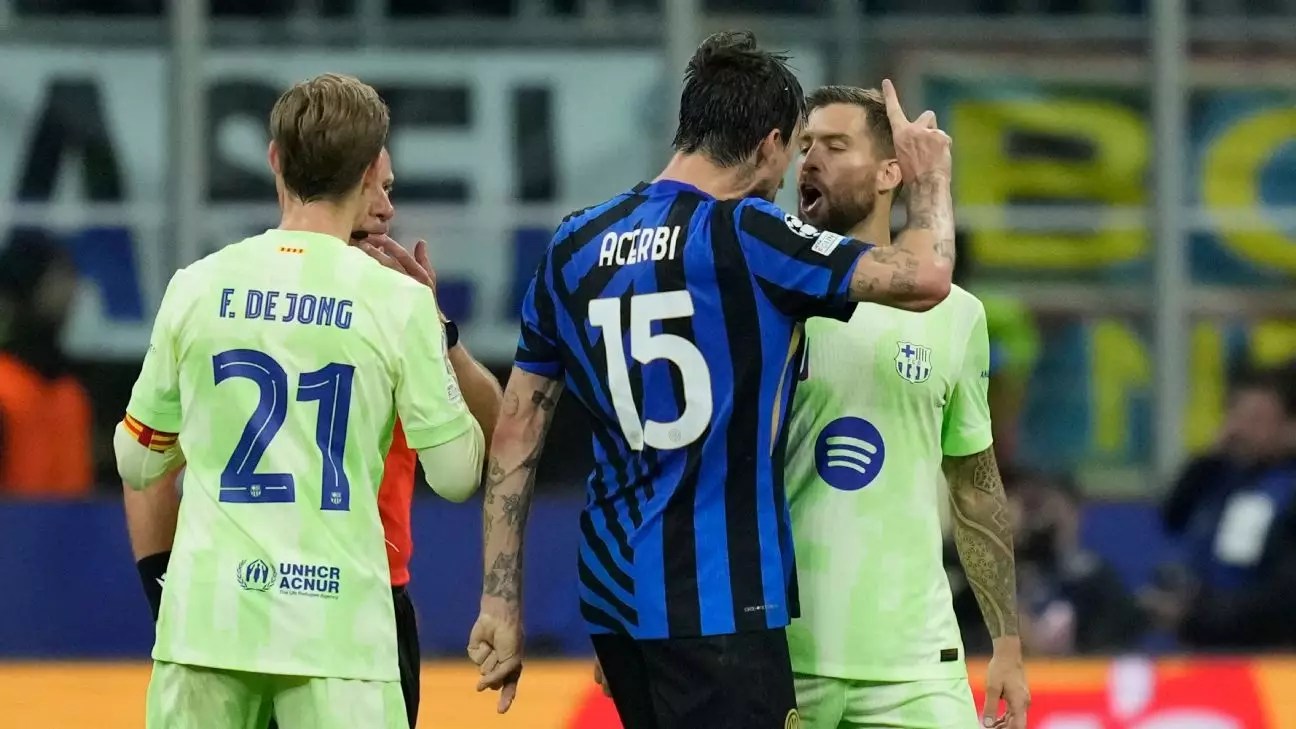In an electrifying Champions League semifinal, the clash between Barcelona and Inter Milan turned into a spectacle that transcended mere football. As both teams fought for destiny, the emotions flared, particularly in the aftermath of Inter’s second goal scored by Hakan Çalhanoğlu through a penalty kick. The play was not just marked by skill on the field but also by palpable tension, especially between Barcelona’s Iñigo Martínez and Inter’s Francesco Acerbi. The incident raised questions not only about sportsmanship but also the intensity of rivalry present at this elite level.
Martínez’s Controversial Response
Following the goal, Acerbi celebrated in proximity to Martínez, a moment that provoked the Barcelona defender’s frustration. Reports indicate that an aggressive exchange ensued, with Martínez adamantly denying any intent to spit at Acerbi. “The spit was a meter away from him,” he asserted, emphasizing the lack of physical connection in his defense. While Martinez acknowledged the emotional intensity of the moment, his rebuke raises broader discussions about athlete comportment and the split-second decisions that can lead to reputational damage. In a world where sportsmanship is highly valued, even the subtlest gestures can escalate into heated confrontations.
Referee’s Role in the Encounter
The officiating of this match has come under scrutiny, particularly regarding the decision-making processes during key moments. Referee oversight is crucial in maintaining the integrity of such high-stakes games. Despite Acerbi’s complaints about the alleged spitting incident, the lack of a formal response from the referee or VAR left many questioning the standards of officiating. This lack of punitive action not only evoked frustration among the players but also served as a catalyst for Barcelona’s later assertions regarding the officiating. Midfielder Pedri’s call for UEFA to investigate the referees illustrates a growing sentiment among teams that clarity and accountability are essential, especially at this level of competition.
Role of Varied Emotions in Competitive Sports
When examining the dynamics of this intense semifinal, one must consider the emotional landscape of competitive sports. The drive to win can manifest in various uncontrollable ways, be it elation or rage. In this contest, both teams demonstrated exceptional resolve, culminating in a 4-3 victory for Inter after extra time, further underscoring the high-pressure scenarios that players face. Moments like these shape identities, not just for the players involved, but for clubs and fans alike. The intense rivalry between Barcelona and Inter serves as a reminder of the dual nature of sports—where beauty and chaos coexist.
Looking Ahead: The Final Showdown
As Inter Milan now gears up to face either Paris Saint-Germain or Arsenal in the final, the ripples from this semifinal will undoubtedly echo into the future. The narrative of this match, rife with emotional tension and spectacle, will linger in the minds of players and fans. What remained at stake was not simply victory but honor, legacy, and the essence of sport itself. The intense rivalry, marked by moments of controversy and high drama, ensures that the Champions League remains a battleground for both athletic prowess and emotional resilience. The fallout from this encounter serves as a poignant reminder that, in sports, every moment can become a defining chapter in a larger story.


Leave a Reply